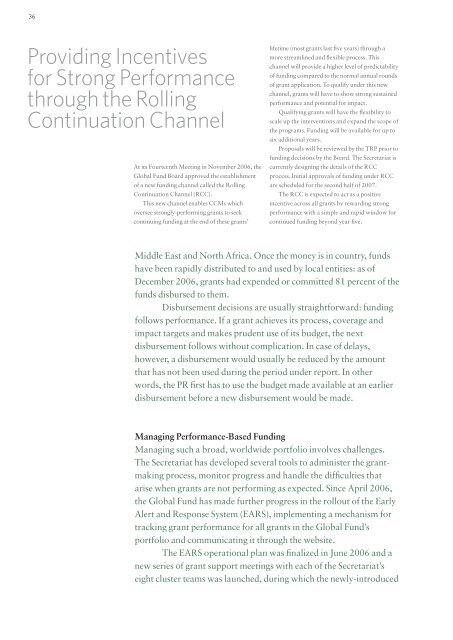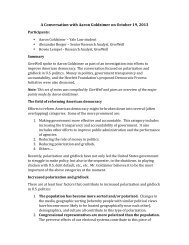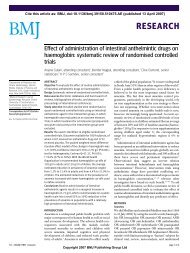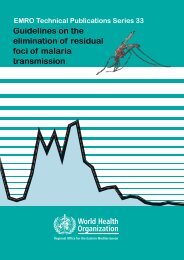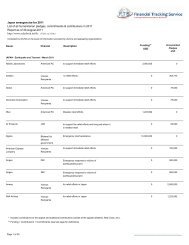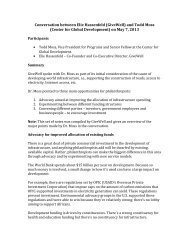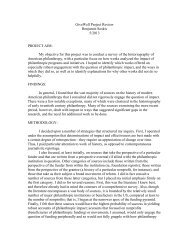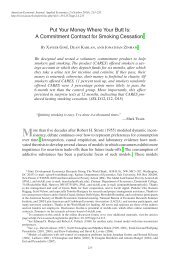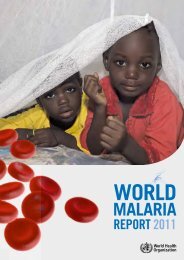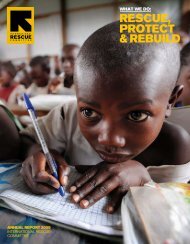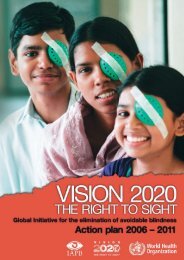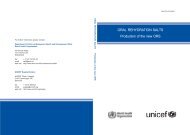Annual Report 2006 - The Global Fund
Annual Report 2006 - The Global Fund
Annual Report 2006 - The Global Fund
- No tags were found...
Create successful ePaper yourself
Turn your PDF publications into a flip-book with our unique Google optimized e-Paper software.
36<br />
Providing Incentives<br />
for Strong Performance<br />
through the Rolling<br />
Continuation Channel<br />
At its Fourteenth Meeting in November <strong>2006</strong>, the<br />
<strong>Global</strong> <strong>Fund</strong> Board approved the establishment<br />
of a new funding channel called the Rolling<br />
Continuation Channel (RCC).<br />
This new channel enables CCMs which<br />
oversee strongly-performing grants to seek<br />
continuing funding at the end of these grants’<br />
lifetime (most grants last five years) through a<br />
more streamlined and flexible process. This<br />
channel will provide a higher level of predictability<br />
of funding compared to the normal annual rounds<br />
of grant application. To qualify under this new<br />
channel, grants will have to show strong sustained<br />
performance and potential for impact.<br />
Qualifying grants will have the flexibility to<br />
scale up the interventions and expand the scope of<br />
the programs. <strong>Fund</strong>ing will be available for up to<br />
six additional years.<br />
Proposals will be reviewed by the TRP prior to<br />
funding decisions by the Board. <strong>The</strong> Secretariat is<br />
currently designing the details of the RCC<br />
process. Initial approvals of funding under RCC<br />
are scheduled for the second half of 2007.<br />
<strong>The</strong> RCC is expected to act as a positive<br />
incentive across all grants by rewarding strong<br />
performance with a simple and rapid window for<br />
continued funding beyond year five.<br />
Middle East and North Africa. Once the money is in country, funds<br />
have been rapidly distributed to and used by local entities: as of<br />
December <strong>2006</strong>, grants had expended or committed 81 percent of the<br />
funds disbursed to them.<br />
Disbursement decisions are usually straightforward: funding<br />
follows performance. If a grant achieves its process, coverage and<br />
impact targets and makes prudent use of its budget, the next<br />
disbursement follows without complication. In case of delays,<br />
however, a disbursement would usually be reduced by the amount<br />
that has not been used during the period under report. In other<br />
words, the PR first has to use the budget made available at an earlier<br />
disbursement before a new disbursement would be made.<br />
Managing Performance-Based <strong>Fund</strong>ing<br />
Managing such a broad, worldwide portfolio involves challenges.<br />
<strong>The</strong> Secretariat has developed several tools to administer the grantmaking<br />
process, monitor progress and handle the difficulties that<br />
arise when grants are not performing as expected. Since April <strong>2006</strong>,<br />
the <strong>Global</strong> <strong>Fund</strong> has made further progress in the rollout of the Early<br />
Alert and Response System (EARS), implementing a mechanism for<br />
tracking grant performance for all grants in the <strong>Global</strong> <strong>Fund</strong>’s<br />
portfolio and communicating it through the website.<br />
<strong>The</strong> EARS operational plan was finalized in June <strong>2006</strong> and a<br />
new series of grant support meetings with each of the Secretariat’s<br />
eight cluster teams was launched, during which the newly-introduced


